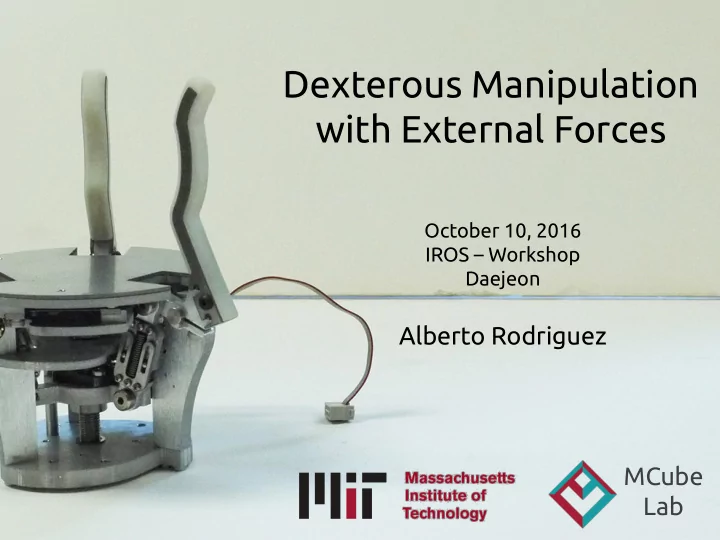

Dexterous Manipulation with External Forces October 10, 2016 IROS – Workshop Daejeon Alberto Rodriguez MCube Lab
Intrinsic vs. Extrinsic Dexterity
Extrinsic Dexterity Exploit Robot Environment [Nikhil Chavan-Dafle et al., “Extrinsic Dexterity: In-Hand ManipulaAon with External Forces”, ICRA 2014]
Extrinsic Dexterity Controlled Pushes against the Environment High accuracy – High force – High speed – Large Workspace
Extrinsic Dexterity Controlled Pushes against the Environment … plan these mo@ons? How to … monitor their execu@on? … make them reliable? … make them fast?
Prehensile Pushing Problem DescripAon Plan arm mo@ons to “move the environment”
Prehensile Pushing Problem DescripAon Given: ü Shape and mass of object. ü Fric1on coefficients. ü Kinema1cs of gripper. ü Gripping forces. ü Loca1on of contacts. ü Pushing force. Find mo@on and forces applied to the object.
Prehensile Pushing Main Challenges 1 - Need to model reliability Sensi@vity to kinema@cs, gripping force, and pushing velocity.
Prehensile Pushing Main Challenges 2 - Need to model complex contacts In order to exploit them ü Kinema1c constraints from different contact geometries. ü Linear and rota1onal fric@on. ü Computa1onally tractable.
Prehensile Pushing Problem FormulaAon Find a trajectory of forces and mo1ons that respects ü Newtonian mechanics. ü Fric1on laws/principles. ü Rigid body. ü Complex contacts. ü Unilaterality of contact. ü Mo@on of the pusher . [Nikhil Chavan-Dafle et al., “Prehensile Pushing: In-Hand ManipulaAon with Push PrimiAves”, IROS 2015]
Prehensile Pushing Problem FormulaAon ü Newtonian mechanics. ü Unilaterality of contact. ü Rigid body and mo1on of ü Complex contacts. the pusher . a 2 � ~ ~ a 1 a j = ~ a 1 + dist ( p 2 , p 1 ) dist ( p j , p 1 ) ~ ü Coulomb fric1on . [Nikhil Chavan-Dafle et al., “Prehensile Pushing: In-Hand ManipulaAon with Push PrimiAves”, IROS 2015]
Prehensile Pushing Problem FormulaAon Problem formula@on based on many assump1ons : ü Uniform, isotropic, and determinis@c Coulomb fric@on. ü Maximum power dissipa@on. ü Quasi-dynamic interac@on. ü Rigid contact. ü Perfect knowledge of geometries and iner@as. How usable is the model?
Prehensile Pushing We need model valida1on
Prehensile Pushing ValidaAon Automated Experimental Setup Capture: ü Mo1on of robot and object. ü Forces / torques at all contacts. Varia@ons in: ü Contact geometry . ü Gripping force . ü Pusher mo1on . [Roman Kolbert et al., “Experimental ValidaAon of Contact Dynamics for In- Hand ManipulaAon”, ISER 2016]
Prehensile Pushing ValidaAon Experiment: Pivo1ng Push [Roman Kolbert et al., “Experimental ValidaAon of Contact Dynamics for In- Hand ManipulaAon”, ISER 2016]
Prehensile Pushing ValidaAon Experiment: Linear Push [Roman Kolbert et al., “Experimental ValidaAon of Contact Dynamics for In- Hand ManipulaAon”, ISER 2016]
Prehensile Pushing Prehensile Pushing Challenges Challenges Variability During experiments with same ini@al condi@ons. Stability Some pushes are s@ll inherently unstable and difficult to control.
Summary Prehensile Pushing Challenges ü Extrinsic dexterity - specially for simple gripers. ü Good approxima@on to contact dynamics . ü Evaluate and reinforce with data when possible. ü Close the loop! MCube Lab
Recommend
More recommend